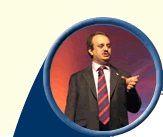|
Infectious Ideas
Sound bites won't fix education. It will take sound education practices, hard work and the ability to turn ideas into action
By Gary S. Stager, Ph.D.
Originally published in District Administration Magazine - November 2002
© 2002 Professional Media Group LLC
I am an enthusiastic user and advocate of digital technology. I not a utopian and I appreciate how colleagues and pundits alike remind us to be aware of the potential negatives associated with technology use. As far as I can tell, the greatest downside of the computing and communications revolution is that every two-bit, weasely politician and mediocre educational bureaucrat in the world has read Peter Drucker.
I have no real beef with Drucker except that his work is full of empty platitudes, best applied in after-dinner speeches and corporate reports written by Arthur Andersen.
I worked in four non-U.S, countries this past summer--Australia, New Zealand, Spain and Brazil. In each case, educators engaged in important, relevant discussions and minds-on projects modeling the best educational practices. In each case, we were regularly interrupted by mind-numbing PowerPoint presentations by "suits" determined to impress us with their capacity for memorization of ditties by Drucker. This year's NECC presentations were full of similar "crapola."
These certified, content-free performers are never interested in what we have to say, our problems, our heroes. An injection of Drucker provides them with all the audacity required to infect our proceedings as well as immunity from any real educational ideas. When these lecturing pathogens wish to demonstrate their grooviness, they speak of how in the future classroom computers and online learning may be used to "eliminate discrepancies in teaching practices and provide highly accurate deep diagnosis." They suggest that the future will be bright as soon as test-prep companies manage public schools. To these learned men, and they are always men, I say, "Shut up!"
To conference organizers, I politely suggest that they invite speakers who have 1) actually accomplished something in their life and 2) have something relevant to share with educators. Any presenter who uses learning as a noun or who speaks in acronyms should be banned.
Ideally, speakers will motivate the audience to improve and then stick around long enough to defend their statements. They should have a demonstrative knowledge of powerful educational ideas. Way too many keynoters are shot by pneumatic tube from the airport to behind the lectern and back again. This protects them from discussing their pronouncements with the assembled riff-raff.
Why Do We Care?
I wonder why educators don't read books by educators? Surely Dewey, Vygotsky, Postman, Meier, Sizer, Papert, Piaget, Bruner, Kozol, Ohanian, Kohn and Frank Smith have written enough to ignite our imagination and inspire improved performance. I wonder if those new-age priests of the bullet points have actually even "read" Drucker. I suspect that there are more than a few copies of "Peter Drucker for Dummies" circulating.
Why do we care what motivational speakers and management authors have to say? Could this be further evidence of our society's contempt for educators and growing anti-intellectualism?
We're big talkers, we Americans. We love the drive-thru safari, but we have the Bose sound system and climate-controlled air conditioning turned up to 11. We devour the simple, the superficial, the titillating. We choose wear imitations over me genuine article. Dabbling is preferable to specificity, depth or genuine innovation.
Long ago, Neff Postman warned that educators need highly sensitive crap detectors. Have our batteries run dead? Shouldn't we have solar crap detectors by now? Or at least hybrids?
Perhaps it's fortuitous that our detectors are out of warranty. Otherwise we would be more sensitive to Orwellian notions like "No child left behind" and "We test because we love." I feared for the future of our society when President Bush quoted science fiction writers, not scientists, during his stem-cell speech. In the name of "higher standards," my children now read two novels per year in high school English. Time must be saved for the more important test preparation exercises.
It's about time we take back the conversation and remind the world that human development cannot be reduced to a handful of cliches.
|
